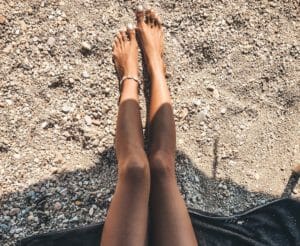
Okay, you probably haven't noticed how often we talk about astaxanthin -- and that's fair. We've kind of slow-rolled our passion for this sea-based antioxidant over the years, tucking a mention into a beauty story here, highlighting a supplement that contains it there, but talking about it in on Zoom calls quite incessantly.
Now that astaxanthin has truly begun trending in beauty and wellness (it protects our skin in the sun like nothing else!), we're giving it the moment it deserves in this deep dive with wellness entrepreuneur, Naomi Whittel...
Your Skin Is Your First Line of Defense
Your army of topical skincare products are no match against the fierce attack your skin undergoes every day. I’m finding this to be particularly challenging right now with skin irritation I’m experiencing from wearing a mask along with my skin’s response to the seasonal changes in weather.
As the body’s largest organ, skin is your first line of defense against UV rays and airborne toxins. Internally, it protects and defends cells against oxidative stress, the aftermath of sun damage, poor sleep and nutrition, and advanced glycation end products (AGES)—highly reactive free radicals that result from excessive sugar intake.
While your body works overtime to fend off these threats, if you can’t neutralize them fast enough, the accumulation starts to degrade the skin’s cellular matrix. Over time, this relentless wear and tear on skin’s structural support can accelerate the formation of fine lines and wrinkles.
There are ways to support healthy skin from the inside out - by consuming plenty of protein and vitamin C, and with collagen supplements. But to fight off the cellular rusting and free radical scavengers that weaken collagen and cause wrinkles, there’s one powerful antioxidant I want you to add to your skincare routine.
I’m Naomi Whittel, a New York Times bestselling author and health advocate with an insatiable curiosity for the healing power of nature. I have spent the past two decades traveling the world the world and recruited an expert team of dermatologists, nutritionists and cellular biologists and together they embarked on a new journey – to understand how via the right nutrition from the outside AND inside they could not just erase signs of aging but write an entirely new future for skin.
Nature’s wrinkle-erasing antioxidant?
You’re used to hearing about antioxidants to support a healthy heart and minimize cognitive decline as you age. And with thousands of antioxidant types ranging from polyphenols to anthocyanins to carotenoids, each one has a unique function in protecting health and defying aging.
And, when it comes to next-level skin health, astaxanthin is the antioxidant that provides superior protection.
Astaxanthin is a deep-red carotenoid found in microalgae and small crustaceans, and the marine life that feast on them. Salmon, shrimp and lobster owe their pink coloring to astaxanthin, as do flamingoes. In fact, these fabulous birds are born white or brown. It’s only when their carotenoid-rich diet kicks in that they take on their signature pink hue.
Though astaxanthin is classified as a carotenoid, it’s much more unique and powerful than other members in its class, and here’s why…
Most other carotenoids are broken down and converted into retinol, a form of vitamin A. But astaxanthin stays intact—supplying 100% of its antioxidant power to combat free radicals and maintain collagen’s firm structure.
In fact, clinical studies show that astaxanthin has a myriad of skin benefits, such as:
Protecting the skin’s cellular matrix
Helping restore essential skin proteins
Locking in hydration
Curbing the formation of creases and fine lines
So, let’s first explore exactly how this skin-renewing powerhouse works at the cellular level to increase the production of two essential skin proteins – collagen and elastin.
Protecting the cellular matrix -- where wrinkles start...
Skin and other connective tissue contain cellular factories called fibroblasts that produce collagen and other skin-plumping proteins and fibers. Together, these structures create a firm and elastic cellular matrix — the foundation of smooth, line-free skin.
In our youth, collagen synthesis peaks and the cellular matrix is strong, which is why children have such plump, firm skin.
Over time, this structural framework breaks down as fibroblasts age and sustain free radical damage along with a gradual slowdown in the production of collagen and elastin.
But in a study published in the International Journal of Molecular Sciences, astaxanthin was found to increase production of both collagen and elastin. By stimulating production of these vital skin proteins, this all-star antioxidant works to ensure that the cellular matrix is strengthened and renewed as we age.
Fix sun damage and dark spots.
You’re well aware of the harmful effects of the sun’s ultraviolet rays. It’s the leading cause of photoaging—premature signs of aging that include wrinkles, dark spots, loose skin and uneven texture.
UVA rays penetrate the layers of the skin much deeper than UVB rays. When they reach the deepest layer, the dermis, they unleash a particularly harmful class of free radicals known as ROS compounds that when left unchecked can wreak havoc on skin’s firmness and elasticity.
But an anti-aging study on astaxanthin indicated it could visibly improve skin’s condition by reducing the appearance of wrinkles and age spots, and correcting dry skin if taken consistently for 6-8 weeks.
That’s a short time to counter the effects of decades of sun damage. No ordinary antioxidant can do that!
In fact, researchers tested astaxanthin against 26 of the most powerful antioxidants on earth for its ability to neutralize singlet oxygen—a highly destructive type of free radical. The results were remarkable: astaxanthin proved to be the most potent of them all—40X more powerful than beta-carotene and an incredible 6,000X more powerful than vitamin C!
Proper Hydration Means Fewer Fine Lines and Wrinkles
If your skin has lost moisture and radiance over the years, astaxanthin can help revive dull, lackluster skin in another powerful way.
Moisture is the hallmark of a healthy glow. Well-hydrated skin is actually the easiest way to look instantly younger. Aging and changes in hormone levels affect your skin’s ability to produce skin-quenching, plumping compounds such as ceramides and hyaluronic acid.
But studies show that when cellular walls are supported with astaxanthin, they can better retain skin’s moisture. In one study, participants were given either an oral astaxanthin supplement or a placebo for 16 weeks that included the transition from summer to fall. Typically, this seasonal change can cause skin to undergo considerable moisture loss.
At the end of the 16 weeks, those supplementing with astaxanthin had significantly more skin hydration as well as fewer fine lines and wrinkle.
What’s the best astaxanthin for brightening dull skin?
If you want to fortify your skin with the age-defying power of antioxidant, you can start by adding the seafood that I mentioned earlier to your diet. But unless you eat a dinner-sized portion of wild-caught salmon every single day, the only way to get a therapeutic dose of astaxanthin is through a daily supplement.
Typically, astaxanthin is derived from ocean microalgae, but with all of the toxins being dumped into our oceans these days, this source of astaxanthin simply doesn’t make the grade for my strict standards for purity and potency.
To avoid this, I scoured the globe for the purest, most potent astaxanthin available, and you’ll never guess where I discovered organically grown astaxanthin: in the remote Arava Desert of Israel.
It turns out that the hot desert climate of the Arava is perfect for cultivating unrefined, organic astaxanthin. And it’s not only pure… it’s more powerful.
Lab tests verify that astaxanthin from the Arava Desert contains an extraordinarily high level of the active compounds that make it such a powerful free radical neutralizer.
Organic, Non-GMO Microalgae from Israel’s Arava Desert
To bring you the most nourishing astaxanthin on earth, I created NAOMI Organic Astaxanthin made with organic microalgae from the Arava Desert. It delivers a full, research-based dose of 12 mg of organic astaxanthin—that’s triple the dose of many popular astaxanthin formulas.
This is why NAOMI Organic Astaxanthin is the best option for you:
Made from Highest Quality Ingredients: NAOMI Organic Astaxanthin contains AstaPure®, a powerful, natural, organic form of astaxanthin sourced from the purest microalgae grown in the Arava Desert. This is the most potent form of astaxanthin and free of contaminants and toxins.
Extra Strength 12 mg Dosage: NAOMI Organic Astaxanthin contains 300% more astaxanthin per serving than most other astaxanthin supplements. Research shows that the only way to get the high levels of astaxanthin shown to provide the full range of remarkable health benefits is to take a supplement that provides 12 mg of astaxanthin daily. The typical 4 mg dose is just not enough to get the benefits you are looking for.
Organic and Non-GMO: NAOMI Organic Astaxanthin is certified organic and non-GMO. And because it’s clean and pure, you avoid the toxins and plastic particles that are often present in sources dredged from the ocean and other less than pristine sources. And whatever you do, don’t waste your money on any synthetic form, which is made from petrochemicals and is far less potent!
NAOMI Organic Astaxanthin is sourced from Israel and manufactured here in the U.S.A. in an FDA regulated facility. Product purity is my promise to you.
Try NAOMI Organic Astaxanthin
For As Low As $20 Per Bottle + Free Shipping
Your 100% happiness is guaranteed with my 365-day return policy. Take NAOMI Organic Astaxanthin every day as suggested. If you’re not fully satisfied, we’ll give you your money back. No questions asked. Add astaxanthin to your daily skincare routine today. You’ll be amazed at the difference it can make!
This story is brought to you in partnership with Naomi. From time to time, TCM editors choose to partner with brands we believe in to bring our readers special offers. The Chalkboard Mag and its materials are not intended to treat, diagnose, cure or prevent any disease. All material on The Chalkboard Mag is provided for educational purposes only. Always seek the advice of your physician or another qualified healthcare provider for any questions you have regarding a medical condition, and before undertaking any diet, exercise or other health-related programs.
The post What the Heck is Astaxanthin (You May Have Noticed We Talk About It A Lot) appeared first on The Chalkboard.
from The Chalkboard https://ift.tt/3u58vwu
via IFTTT


No comments:
Post a Comment